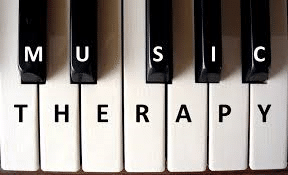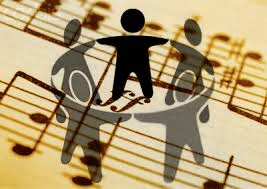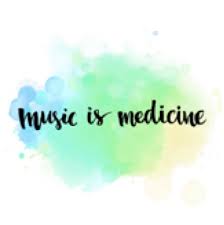I recently saw a music producer whose ears are her life – and unfortunately she suffered a sudden partial sensori-neural hearing loss in one ear. We were lucky enough to have her seen by an otolaryngologist within hours and after an MRI, steroid injections were started. So far, this is not an unusual situation and course of action although, with a few “favors” cashed in, we were able to get her into the system faster than usual.
The producer, not wanting to leave anything to chance, searched out Dr. Google, and found something that I was not aware of. This was a January 2014 article with the great name “Constraint-induced sound therapy for sudden sensorineural hearing loss –behavioral and neurophysiological outcomes”.

Music therapy can be useful BUT in conjunction with steroidal therapy. Courtesy of www.Risingstarzmusic.com
The idea behind the research is to listen to music in the affected ear while plugging the unaffected ear; this supposedly acts synergistically with the steroid injections to facilitate cochlear function recovery.
This was published in a www.Nature.com publication so it was well peered reviewed, but I was surprised that I had never heard of this.
The word “Constraint” in the title refers to plugging up the unaffected ear (with an earplug) and then music is played at a safe level in the affected ear. The authors of the report claim that this can also be quite useful to re-establish normal cortical auditory maps; something that can be permanently altered despite resolution of the peripheral pure tone sensori-neural hearing loss.
The authors provide several possible explanations for how this works. They point out that “sound stimulation dilates blood vessels and increases red blood cell velocity in the cochlea”. This, they argue, could improve the micro-circulation of blood (and oxygen) within the cochlea. Since oxygen deprivation is a major cause of cochlear hair cell death, this improved blood circulation may have helped to resolve this hypoxic situation. The authors also point out that even if there was no oxygen deprivation in the damaged cochlea, improved vascular flow brought about by sound stimulation would improve the overall cochlear metabolism and other metabolic benefits by allowing a more optimal removal of toxic substances in the cochlea such as rogue anti-oxidants.
The authors of this study do caution that they still can’t really conclude that the music in the affected ear was, in itself, beneficial or whether the music enhanced the steroidal effect. There is no evidence to date that music in the affected ear can be useful; steroidal use is still the gold standard and music in the affected ear appears to supplement the steroidal effect but it is yet unknown what the mechanism/s is/are.
So – while this is interesting (and something that I had previously not known as a clinical audiologist), it is important to underscore that listening to music in the affected ear is NOT a replacement for steroidal therapy. t appears to supplement the steroidal therapy but the mechanisms are still not understood. Beware of avoiding the otolaryngologist at a time like this. This is not a substitute for medical or steroidal intervention.








Sixteen months ago I experienced sudden deafness in one ear. Had the steroid injections which improved my hearing by about 20%; I am maintaining that level. This article on music therapy peaked my interest so I will listen to music with one earbud in the affected ear. Is there any particular type of music that is most beneficial?
Hi Dr. Chasin. My husband suffered a profound SSNHL two months ago. He began steroids withiin 24 hours. Two-weeks later, he noticed he could hear some sound in that ear, and started using an earbud to listen to music in just his bad ear whenever he was sitting by himself. He says it helps him feel less deaf in that ear, and it masks out the tinnitus. His hearing loss is now in the severe range, except for a normal threshold at 250 Hz. He has 4% word recognition when his good ear is masked, 64% word recognition when it is not masked. We’re going to try a hearing aid in his ‘deaf’ ear next week. If he was one of my regular patients, I probably would have told him that ear is unaidable. Now I’m rethinking that. We’ll see.
Always an interesting case where an “unaidable” is perhaps aidable after all. I have had (and still have) some patients on my caseload where I have successfully fit hearing aids on unaidable ears. This only appears to be successful when the better ear is normal. And your husband is correct that its more than just a word recognition score in that ear- it can provide a feeling of liveness or balance regardless of the speech clarity.
This area is new to me as well and I am not yet that familiar with the body of research in this area. I suspect that we don’t know much about what music is the best, if any.
If any other readers have more experience in this area, we would love to hear from you.